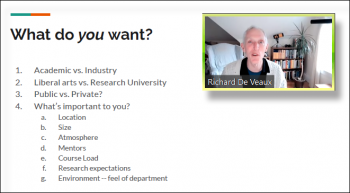
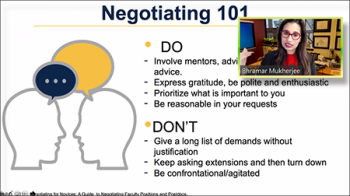
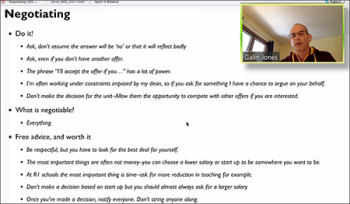
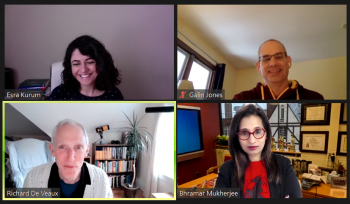
The session was organized and hosted by both the Academic Affiliates Committee and NISS Graduate Student Network. (see Event page) Where earlier webinars have focused on how to get a job in academia, an important but rarely discussed topic is, “What happens when you get an offer?”, "How do you choose between the offers?", and "What factors are negotiable?" It must have resonated with many because over 100 attendees logged into this session!
This webinar was led by three individuals who brought to the discussion obvious and valuable experience as department chairs who have been through the hiring and negotiation process many, many times. In addition, they represented three different academic scenarios: Dick De Veaux is department chair of the Department of Mathematics and Statistics at Williams College, Bhramar Mukherjee serves as department chair of the Department of Biostatistics at the University of Michigan, and Galin Jones serves as School of Statistics at the University of Minnesota. As a result, it was interesting to compare and contrast the differences in the hiring process between a small liberal arts college to two R1 institutions, and even between biostatistics and a perhaps a more traditional statistics department and the other opportunities that exist at R1 institutions.
Dick De Veaux (Williams College) started his comments encouraging those on the job market to reflect on what it is they want out of a position in academia in the first place. He expressed the importance of being able to truthfully come to terms with these fundamental questions as a critical part of a job search, thinking about the short term but also longer term as well. He then provided advice and comments about how and what to negotiate once a position has been offered.
Bhramar Mukerjee (University of Michigan) walked through a detailed list of items to consider throughout the hiring and negotiation process. This included comments on the following topics: why negotiate, do your homework, what postdocs need to consider, resources for research and many others. Her list was made even more valuable because of the personal comments, advice, tips and anecdotes that accompanied all of these points. In particular, and acknowledged by both of the other speakers, was the comprehensive list of factors to consider as part of the negotiation process. They are included in her slide below:
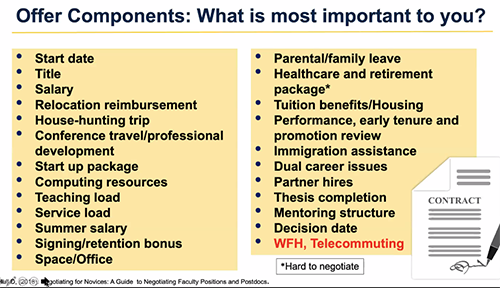
Galin Jones (University of Minnesota) was the final speaker. He reviewed the hiring process in his department and commented on the institutional policies that he has to work with. He then described what he would use as the structure of an offer for a new assistant professor in his department. He concluded by providing a number of items of advice in negotiating a job offer.
“You are not negotiating with me. I am actually negotiating with the Dean on your behalf. If I am contacting you about a job offer, it means I want you there and I am going to do everything I can to make it happen.”
Galin Jones, (University of Minnesota)
A good amount of time was given to answering questions and moderator Esra Kurum (University of California, Riverside) was kept busy fielding questions and managing the discussion that followed. What made the conversation interesting was noting when the speakers agreed. Whereas with some topics, their comments varied significantly because of the nature of their institutional context or policies.
There were several very interesting questions, including a couple of tricky ones such as: “Should one insist on arrangements being meticulously captured in written contracts?”, “Is there anything in particular to consider with regard to pure research faculty positions?”, “Has COVID-19 affected what is appropriate to ask for during negotiation?”, “When is the best time to ask about dual career opportunities?”, “Should negotiations occur via email or phone?”, and “What about going up early for tenure?” Wow – so many questions!! But this is understandable because this is a big move for anyone.
If you are on the job market, have applications out there, or have an offer in hand – don’t miss this session! No matter what academic institution you are interested in, anyone can benefit from reviewing this conversation! Play the recording of this session along with the copies of the slides that the speakers used below. The slides not only provide you with the key points that were offered but also include links and email addresses to additional resources and contacts that should not be ignored!
Recording of the Session
Slides used by the Speakers
Dick De Veaux, (Williams College)
Bhramar Mukherjee, (University of Michigan)
"How to Negotiate a Job Offer?"
Galin Jones, (University of Minnesota)
